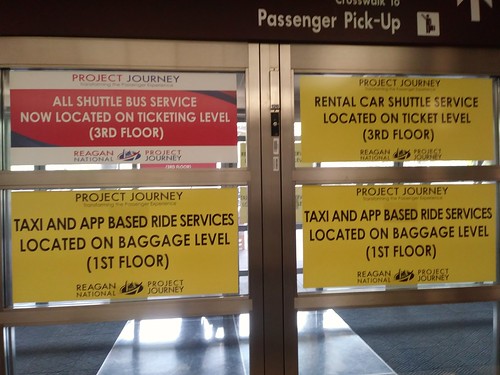Public fees/taxes/charges on ride hailing trips

Information about the reorganization of ground transportation service delivery at National Airport, Virginia. National Airport has shifted its shuttle buses to the departures deck of the airport, and ride hailing services are using the "basement" deck use the deck outside of baggage claim.
Chicago, DC and NYC ("When Calling an Uber Can Pay Off for Cities and States," New York Times), and many airports have or are aiming to assess fees on ride hailing services to fund transit and other transportation infrastructure. This comes as research demonstrates that:
1. Use of ride hailing services comes the expense of public transit ("Study: Ride-Sharing Decreases Public Transit Use," Government Technology) and increases the number of car trips made and car trips on the road;
2. Ride hailing service use is impacting airport revenues, especially in terms of parking revenues ("Airports Are Losing Money as Ride-Hailing Services Grow," New York Times).
Uber has reacted in Rhode Island, by refusing to serve people at TL Green Airport, in response to the imposition of service fees on ride hailing there ("Life without Uber: T.F. Green passengers adjust to new reality," Providence Journal). The article includes a chart listing the pick up/drop off fees charged to ride hailing services at 15 different airports. From the article:
Other passengers used Lyft, which recently reached an agreement with the airport to have the pickup fee reduced to $5. Or they got into waiting taxis, at double the price of a ride-share vehicle to get to Providence.
The dispute began last summer, when the airport corporation increased the pickup fee from $3 to $6, saying it needed to recoup revenue from rental car fees and long-term parking that had decreased because more people were using ride-sharing companies. Uber cried foul, saying Green’s $6 pickup fee was the highest in the country.
Airport corporation spokesman William J. Fischer countered that since there is no drop-off charge, Green is “right in line” with other airports that charge both ways.
For example: The airport in Orlando charges $5.80 for pickups; Atlanta charges $3.85 for pickups; both airports in Chicago charge $5.50 each way; Detroit, $5.50 each way and Boston’s Logan Airport $3.25 for a pickup.
 Interestingly, in Reclaiming our cities and towns: better living with less traffic, David Engwicht argued that there should be additional "taxes" on private automobiles as a kind of "reparations" for the costs they imposed on society including on making public transit less effective.
Interestingly, in Reclaiming our cities and towns: better living with less traffic, David Engwicht argued that there should be additional "taxes" on private automobiles as a kind of "reparations" for the costs they imposed on society including on making public transit less effective.That's relevant to the concept of imposing additional fees on ride hailing trips, because of how their venture capital subsidized fares--below cost--impose costs on other modes.
Note that this book laid the foundation for creating what we now call "transportation demand management."
Labels: airlines/air travel, airports, sustainable mobility platform, taxi services/ride hailing, transportation demand management, transportation planning



0 Comments:
Post a Comment
<< Home